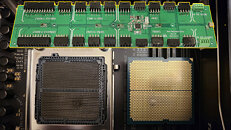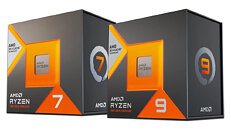T0@st
News Editor
- Joined
- Mar 7, 2023
- Messages
- 2,077 (3.17/day)
- Location
- South East, UK
According to investigations undertaken by Igor's Lab and Hardware Busters this week it seems that AMD's problematic lineup of Ryzen 7000 & Ryzen 7000X3D CPUs are consuming unexpected levels of power in short bursts when running in idle mode. In conducting more in-depth tests over the past few days, Igor Wallossek and (outgoing TPU PSU expert) Aristeidis Bitziopoulos have both found that that the aforementioned AMD processors are producing (to the testers' slight concern) power spikes in situations involving minimal computing activity. It is not currently known whether the sharp climbs in power consumption are in any way related to the burnout issues experienced by unlucky overclockers this week.
Aris/crmaris (at Hardware Busters) says that he has tested many of the affected processors in the past, but was not privy to any major problems relating to burnout or power consumption spikes. By running new tests this week, using his own Powenetics v2 board, Aris has found out that: "There are some interesting facts here, which I didn't pay much attention to during the reviews because I only look at the average values and not the peak ones in idle. In the 7950X3D, there is a high spike during idle at 130 W, which is unjustified because the peak CPU load is only 3.53%. Even with the Curve Optimized enabled and a -15 setting, the idle power spike is close to 125 W, so something is happening there. On the 7800X3D, the spike during idle stays low, but this is not the case for the 7900X, which has an idle power spike at 109 W, while the peak CPU load at idle was at 5.12%, so these 109 W are not justified, either."


Video coverage of the matter has been provided by Hardware Busters in their "AMD Ryzen 7000 Series burn issues? Our Findings!" upload to YouTube:
Igor does not get dramatic about the latest findings, and suggests that AMD should not be judged too harshly: "Aris (crmaris) and I are of the opinion that these load peaks (which I could reproduce 1:1 in the meantime, by the way), primarily have nothing to do with the described CPU dying - we put a lot of emphasis on that to avoid a false panic. But on the other hand, such transients are nothing you need for a really stable system. Aris has also already spoken to some of his industry contacts, who have told him that the overall RMA rates of the 7000 series are actually lower than those of the 5000 series. This should avoid panic and also not discourage anyone from buying a new AMD CPU."
View at TechPowerUp Main Site | Source
Aris/crmaris (at Hardware Busters) says that he has tested many of the affected processors in the past, but was not privy to any major problems relating to burnout or power consumption spikes. By running new tests this week, using his own Powenetics v2 board, Aris has found out that: "There are some interesting facts here, which I didn't pay much attention to during the reviews because I only look at the average values and not the peak ones in idle. In the 7950X3D, there is a high spike during idle at 130 W, which is unjustified because the peak CPU load is only 3.53%. Even with the Curve Optimized enabled and a -15 setting, the idle power spike is close to 125 W, so something is happening there. On the 7800X3D, the spike during idle stays low, but this is not the case for the 7900X, which has an idle power spike at 109 W, while the peak CPU load at idle was at 5.12%, so these 109 W are not justified, either."


Video coverage of the matter has been provided by Hardware Busters in their "AMD Ryzen 7000 Series burn issues? Our Findings!" upload to YouTube:
Igor does not get dramatic about the latest findings, and suggests that AMD should not be judged too harshly: "Aris (crmaris) and I are of the opinion that these load peaks (which I could reproduce 1:1 in the meantime, by the way), primarily have nothing to do with the described CPU dying - we put a lot of emphasis on that to avoid a false panic. But on the other hand, such transients are nothing you need for a really stable system. Aris has also already spoken to some of his industry contacts, who have told him that the overall RMA rates of the 7000 series are actually lower than those of the 5000 series. This should avoid panic and also not discourage anyone from buying a new AMD CPU."
View at TechPowerUp Main Site | Source







